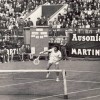By Randy Walker
Forty years ago today marked one of the most courageous Davis Cup efforts of all time to finish off one of the most infamous Davis Cup matches in the history of the event. It was on October 15, 1972 when Stan Smith, now the President of the International Tennis Hall of Fame, defeated now billionaire and Ion Tiriac in a five-set tussle to clinch the USA’s 3-2 victory over Romania to win the Davis Cup in Bucharest, Romania.
This Davis Cup final was the first to be played in the non-Challenge Round format, where all teams played out to reach the final with a chance to win the Davis Cup. Previously, since the event started in 1900, the nation that won the championship would only have to defend the title in the final the next year in what was called the “Challenge Round.” Romania was awarded the choice of ground for this historic final, the first time that a Davis Cup championship would be contested outside of the four “Grand Slam” nation’s territories (United States, France, Britain and Australia/Australasia). The Davis Cup final was also played weeks after Islamic terrorists killed Israeli athletes at the Munich Olympic Games and threats were made against U.S. team members Brian Gottfried and Harold Solomon, both Jewish Americans. In addition to the high tension and threat of terror, the U.S. team members had to endure more than just a partisan Romanian crowd, but also partisan linesmen, who had more than a casual tendency to call close line calls in favor of the home team of Tiriac and Ilie Nastase.
The following are how each of the three days unfolded as excerpted from my book ON THIS DAY IN TENNIS HISTORY (available at www.TennisHistoryBook.com)
October 13, 1972 – Amid high security and terrorist threat tension, the United Statesand Romaniaopen play in the Davis Cup Final in Bucharest, Romania, as Stan Smith defeats Ilie Nastase 11-9, 6-2, 6-3 while Ion Tiriac defeats Tom Gorman4-6, 2-6, 6-4, 6-3, 6-2. The spirit of the Davis Cup final permeates all corners of Bucharest as posters of Nastase and Tiriac are found everywhere – even bakeries sell giant cakes in the shape of the Davis Cup. Tension and security is high during the series as false rumors are spread that the same assassins who struck during the 1972 Munich Olympics would strike the U.S.team during the final. Smith plays what Bernard Kirsch of the New York Times calls “unexcitingtennis” to beat Nastase in 2 hours, 14 minutes. Says Smith of Nastase, “He knows I’m always bearing down. He’s knows I’m not going to get discouraged and he knows he’s got to play well all the time.” Gorman is bothered by not only fatigue, but questionable line calls from Romanian linespeople, who are accused of favoritism to the home team. Argentinean chair umpire Enrique Morea overrules six lines calls in the match, causing for “do overs.”

October 14, 1972 – Stan Smith and Erik van Dillen give the United States a 2-1 lead over Romania in the Davis Cup final in Bucharest, Romania, dominating Ilie Nastase and Ion Tiriac 6-2, 6-0, 6-3 in just 68 minutes. After the score is tied at 2-2 in the first set, the Americans reel off 11 straight games to run away with the match. Smith and van Dillen’s run of games solicits the biggest cheers of the afternoon from the small contingent of American fans, which prompts an English-speaking Romanian spectator to yell “Quiet! It’s not a baseball game.” Says Nastase after the match, “We didn’t expect them to play so well.
October 15, 1972 – In one of the greatest Davis Cup matches in history, Stan Smith overcomes “the worst officiating I ever had” and a partisan Romanian crowd to defeat Ion Tiriac 4-6, 6-2, 6-4, 2-6, 6-0 in 2 hours, 50 minutes to clinch the Davis Cup title for the United States over Romania in Bucharest. Smith’s victory gives him the distinction of clinching the Davis Cup victory for the fifth straight year (he would also clinch a six Cup-victory for the U.S.in the 1979 title in doubles with Bob Lutz). Smith, the Wimbledon champion, struggles mightily against Tiriac, who calls himself, “the best player in the world who can’t play tennis” as well as the Romanian linespeople, who are suspect in their fairness. “I started to believe they weren’t going to let me win… no matter how well I played,” Smith says following his victory. Writes Bud Collins in The Bud Collins History of Tennis, “Despite numerous pro-Tiriac officiating calls, Smith, knowing he had to hit winners inside the lines, was too good for Ion.” The fifth set is one of the finest sets of tennis ever played by Smith or seen in Davis Cup play as the reigning Wimbledon champion plays near perfect tennis to roll through the decisive set in just 20 minutes to clinch the 24th Davis Cup title for theUnited States. Writes Bernard Kirsch of the New York Times, “When Smith hit a passing shot for Cup point, he threw his racquet high in the air, went to the net, shook hands with Tiriac and said: “I really lost a lot of respect for you.”
